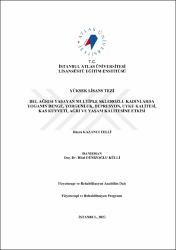| dc.contributor.author | Telli, Büşra Kazancı | |
| dc.date.accessioned | 2023-10-06T12:14:33Z | |
| dc.date.available | 2023-10-06T12:14:33Z | |
| dc.date.issued | 2023 | en_US |
| dc.date.submitted | 2023-08-25 | |
| dc.identifier.citation | Telli, B. K. (2023). Bel ağrısı yaşayan multiple sklerozlu kadınlarda yoganın denge, yorgunluk, depresyon, uyku kalitesi, kas kuvveti, ağrı ve yaşam kalitesine etkisi. (Yüksek lisans tezi, İstanbul Atlas Üniversitesi, İstanbul). Erişim adresi https://hdl.handle.net/20.500.12900/177 | en_US |
| dc.identifier.uri | https://hdl.handle.net/20.500.12900/177 | |
| dc.description.abstract | Kazancı, B. (2023). Bel Ağrısı Yaşayan Multiple Sklerozlu Kadınlarda Yoganın Denge Yorgunluk Depresyon Uyku Kalitesi Kas Kuvveti Ağrı ve Yaşam Kalitesine Etkisi. Yüksek Lisans Tezi, İstanbul Atlas Üniversitesi Lisansüstü Eğitim Enstitüsü, Fizyoterapi ve Rehabilitasyon Anabilim Dalı, İstanbul. Bu çalışma bel ağrısı yaşayan Multiple Skleroz tanılı hastalarda yoganın denge, yorgunluk, depresyon, uyku kalitesi, kas kuvveti, ağrı ve yaşam kalitesine etkisini araştırmak için planlanan bir çalışmadır. Multiple Skleroz tanısı almış 20 kişi randomize yöntemle 10 kişilik iki gruba (yoga ve kontrol) ayrılmıştır. Her iki gruba da tedavi öncesi; denge durumu için Berg Denge Skalası ile, uyku kalitesi için Epworth Uyku Skalası ile, yorgunluk durumu Yorgunluk Şiddet Ölçeği ile, depresyon değerlendirmesi Beck Depresyon Ölçeği ile, kas kuvveti 5 Tekrarlı Otur Kalk Testi ile, ağrı değerlendirmesi Görsel Analog Skalası ile, bel ağrısı değerlendirmesi için Quebec Bel Ağrısı Engellilik Skalası ile ve yaşam kalitesi değerlendirilmesi EQ-5D-3L Genel Yaşam Kalitesi Ölçeği ile değerlendirilmiş olup kontrol grubuna geleneksel fizyoterapi tedavisi uygulanırken yoga grubuna ise geleneksel fizyoterapi tedavisinin yanı sıra belirli asanalardan oluşan yoga programı oluşturulmuştur. Kontrol grubuna 8 hafta boyunca haftada 2 seans geleneksel fizyoterapi seansları uygulanmış olup yoga grubuna ise geleneksel fizyoterapiye ek olarak 8 hafta boyunca haftada 2 gün olmak üzere 16 seans yoga programı oluşturulmuştur. Yapılan tedaviler sonrası yoga grubunda; kas kuvveti, depresyon, uyku kalitesi, yaşam kalitesi, ağrı, bel ağrısı ve yorgunluk durumundaki farklılıklar anlamlı bulunmuşken, gruplar arası karşılaştırmada ise yorgunluk ve uyku kalitesi değerlendirmesi arasındaki farklılıklar anlamlı bulunmuştur (p <0,05). Multiple Sklerozlu hastalarda uygulanan yoga müdahalesinin bazı parametrelerde geleneksel fizyoterapi egzersiz programlarına göre daha iyi gelişmeler gösterdiği görülmüştür. Ancak bu sonuçların gelecekte yapılacak çalışmalar ile doğrulanması gerekmektedir. | en_US |
| dc.description.abstract | Kazancı, B. (2023). The Effect of Yoga on Balance, Fatigue, Depression, Sleep Quality, Muscle Strength, Pain and Quality of Life in Women with Multiple Sclerosis Experiencing Low Back Pain. Master's, İstanbul Atlas University Postgraduate Education Institute, Department of Physiotherapy and Rehabilitation, İstanbul. This study was planned to investigate the effects of yoga on balance, fatigue, depression, sleep quality, muscle strength, pain and quality of life in patients with multiple sclerosis who have low back pain. 20 people diagnosed with Multiple Sclerosis were randomly divided into two groups of 10 people (yoga and control). Before treatment in both groups; with Berg Balance Scale for balance status, Epworth Sleep Scale for sleep quality, fatigue status with Fatigue Severity Scale, depression assessment with Beck Depression Scale, muscle strength with 5 Repetition Sit and Stand Test, pain assessment with Visual Analog Scale, for assessment of low back pain The Quebec Low Back Pain Disability Scale and the assessment of quality of life were evaluated with the EQ-5D-3L General Quality of Life Scale, and traditional physiotherapy treatment was applied to the control group, while a yoga program consisting of certain asanas was created in addition to the traditional physiotherapy treatment for the yoga group. Traditional physiotherapy sessions were applied to the control group for 8 weeks, 2 sessions a week, and for the yoga group, in addition to traditional physiotherapy, 16 sessions of yoga program were created, 2 days a week for 8 weeks. After the treatments, in the yoga group; While differences in muscle strength, depression, sleep quality, quality of life, pain, low back pain and fatigue were found to be significant, the differences between fatigue and sleep quality assessment were significant in the comparison between groups (p <0.05). It has been observed that yoga intervention applied in patients with Multiple Sclerosis is more effective than traditional physiotherapy exercise programs. However, these results need to be confirmed by future studies. | en_US |
| dc.language.iso | tur | en_US |
| dc.publisher | İstanbul Atlas Üniversitesi, Lisansüstü Eğitim Enstitüsü | en_US |
| dc.rights | info:eu-repo/semantics/openAccess | en_US |
| dc.subject | Fizyoterapi rehabilitasyonu | en_US |
| dc.subject | Physiotherapy rehabilitation | en_US |
| dc.subject | Geleneksel Fizyoterapi | en_US |
| dc.subject | Traditional Physiotherapy | en_US |
| dc.subject | Multiple Skleroz | en_US |
| dc.subject | Multiple Sclerosis | en_US |
| dc.subject | Fizyoterapi, Nörolojik | en_US |
| dc.subject | Physiotherapy, Neurological | en_US |
| dc.subject | Rehabilitasyon | en_US |
| dc.subject | Rehabilitation | en_US |
| dc.title | Bel ağrısı yaşayan multiple sklerozlu kadınlarda yoganın denge, yorgunluk, depresyon, uyku kalitesi, kas kuvveti, ağrı ve yaşam kalitesine etkisi = The effect of yoga on balance, fatigue, depression, sleep quality, muscle strength, pain and quality of life in women with multiple sclerosis experiencing low back pain | en_US |
| dc.type | masterThesis | en_US |
| dc.department | İstanbul Atlas Üniversitesi, Lisansüstü Eğitim Enstitüsü, Fizyoterapi ve Rehabilitasyon Ana Bilim Dalı | en_US |
| dc.relation.publicationcategory | Tez | en_US |

















